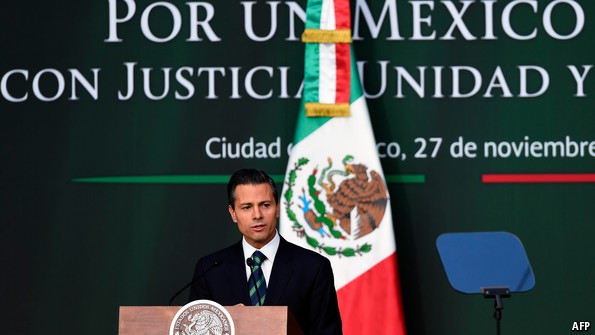The economist / diario19.com

On November 27th Mexico’s president, Enrique Peña Nieto, did what he should have done long ago: he announced a series of measures aimed at making the rule of law a priority of his administration. He did it in response to a groundswell of protest against his government triggered by the disappearance of 43 students in the southern state of Guerrero two months ago. But in failing to acknowledge any responsibility for the crisis, and in failing to challenge the entire political system to clean up its act, he may have missed a chance to turn the tide of public opinion.
In a nutshell, he localised the problem. He said he would draft laws to enable the authorities to remove municipal authorities colluding with drug traffickers, as allegedly happened with tragic consequences for the 43 students. He plans to replace Mexico’s 1,800 municipal police forces with 32 state ones. He ordered an immediate deployment of federal forces into areas of organised crime in Guerrero and nearby. He unveiled plans to create special economic zones in the poor south to encourage investment and reduce crime, as well as promising special treatment to poor farmers in the area.
What he did not acknowledge was that there is rot at the top as well as the bottom, says Miguel Pulido of Fundar, an NGO that promotes transparency. He sidestepped the federal government’s responsibility for letting drug gangs run rampant in the countryside, even though such crimes are federal, not local. There was no cabinet reshuffle signifying that the government was acknowledging the political cost of its failures.
The president announced several initiatives to combat corruption and improve transparency, but there will be widespread doubt about how effective they will be. The first problem is that they will have to go through a Congress riddled with conflicts of interest, not least because politicians have to raise piles of unauthorised money to get elected, and lawmakers almost always water down any proposal that threatens their money supply. The second problem is that Mr Peña’s own political ethics have been in question over a house his wife intended to buy from a developer who has won numerous public contracts. That makes it harder for him to lead by example.
Undoubtedly some of the points he mentioned are a step in the direction of law and order, and could complement the economic reforms he has orchestrated in his first two years in office. A few months ago, they might even have been considered bold. Predictably, big business lobbyists quickly put their voice behind them.
But something in the mood among the country’s rank and file has changed since the students went missing. It is as if the country has drawn a sinister connection between the drug barons who abducted the students and the entire political class, and see them as two sides of the same coin marked with three words: corruption, lawlessness and impunity. This may be excessively cynical. But in failing even to acknowledge that such a mood now exists, Mr Peña risks continuing to look out of touch—as he has since the crisis started.
Comentario en Español
Tras el tristemente célebre mensaje de Peña Nieto el 27 de noviembre de 2014, el semanario británico The Economist criticó “en Línea” que el presidente mexicano no reconoció ninguna responsabilidad por la crisis causada en el país tras la desaparición de 43 normalistas en Iguala, Guerrero, por lo que “podría haber perdido la oportunidad de cambiar el rumbo de la opinión pública”.
Después de dos meses de protestas para exigir la presentación con vida de los 43 estudiantes de la Normal Rural de Ayotzinapa, en las que incluso se ha pedido la renuncia de Peña Nieto, el mandatario dio un mensaje el jueves 27 de noviembre en el que anunció 10 medidas contra la inseguridad y para fortalecer el Estado de Derecho en México. Sin embargo, aunque “anunció varias iniciativas para combatir la corrupción y mejorar la transparencia, existen dudas generalizadas sobre qué tan efectivas serán”, indica el texto de The Economist.
La publicación británica cuestionó el hecho de que Peña no no haya “reconocido el estado de ánimo” de los mexicanos (por las protestas): “El presidente hizo a un lado la responsabilidad federal (…) Ahora corre el riesgo de seguir mirando fuera de la realidad, como ha venido haciendo desde que comenzó esta crisis”.
La desaparición de los normalistas ocurrió el 26 e septiembre pasado, luego de ser atacados y secuestrados por los policías municipales de Iguala que, ayudados por los de Cocula –un municipio cercano–, entregaron a los estudiantes a integrantes del grupo delictivo Guerreros Unidos. De acuerdo con la versión oficial, hay “indicios” de que los 43 jóvenes fueron asesinados e incinerados. Desde entonces, miles de personas en México y el mundo han protestado para exigir justicia en este caso.
La crisis de la administración de Peña Nieto se agravó luego de la publicación de un reportaje de Aristegui Noticias, que llevó a la esposa del presidente, Angélica Rivera, a reconocer que mandó construir una mansión en Lomas de Chapultepec –una exclusiva zona del DF– con una inmobiliaria propiedad de Grupo Higa, una empresa que formó parte del consorcio al que el gobierno mexicano entregó (y revocó días después) la licitación para construir el tren rápido México-Querétaro.
Al respecto, de acuerdo con The Economist, “la propia ética política de Peña Nieto ha sido cuestionada debido al escándalo causado por la intención de su esposa de comprar una casa con una inmobiliaria que ha obtenido numerosos contratos públicos. Eso hace que sea más difícil para él para él dar ejemplo”.








